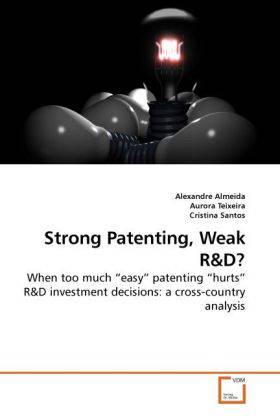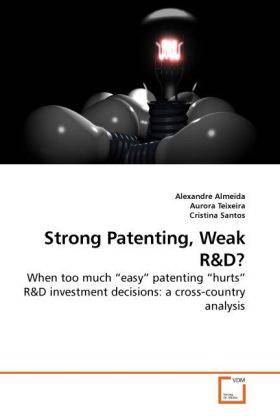
Door een staking bij bpost kan je online bestelling op dit moment iets langer onderweg zijn dan voorzien. Dringend iets nodig? Onze winkels ontvangen jou met open armen!
- Afhalen na 1 uur in een winkel met voorraad
- Gratis thuislevering in België vanaf € 30
- Ruim aanbod met 7 miljoen producten
Door een staking bij bpost kan je online bestelling op dit moment iets langer onderweg zijn dan voorzien. Dringend iets nodig? Onze winkels ontvangen jou met open armen!
- Afhalen na 1 uur in een winkel met voorraad
- Gratis thuislevering in België vanaf € 30
- Ruim aanbod met 7 miljoen producten
Zoeken
€ 48,45
+ 96 punten
Omschrijving
This study contributes to the addressing of the Patent-R&D relationship from a new perspective, analyzing a crucial yet ignored question: Can more patents have a negative effect on R&D investment? Offering an extensive synthesizes of existing theoretical and empirical literature, we focus on the arguments that might sustain a negative impact of patents over R&D. The Patent system seems to have created an incentive to massive patenting with no perceivable significant(maybe even negative as our results show) impact on R&D and as for certain introduced a set of costs that may actually lower the optimal R&D investment level of firms and slow down technological progress. This book builds a strong case against the one-size-fits-all approach of IPR legislation across different technological fields and across different stages of country development, providing an intresting reading both for policy makers, as well as academic researchers. Nevertheless, its comprehensiveness and easy-to-read text also makes it suitable for the general public.
Specificaties
Betrokkenen
- Auteur(s):
- Uitgeverij:
Inhoud
- Aantal bladzijden:
- 96
- Taal:
- Engels
Eigenschappen
- Productcode (EAN):
- 9783639229547
- Verschijningsdatum:
- 16/03/2010
- Uitvoering:
- Paperback
- Formaat:
- Trade paperback (VS)
- Afmetingen:
- 152 mm x 229 mm
- Gewicht:
- 149 g

Alleen bij Standaard Boekhandel
+ 96 punten op je klantenkaart van Standaard Boekhandel
Beoordelingen
We publiceren alleen reviews die voldoen aan de voorwaarden voor reviews. Bekijk onze voorwaarden voor reviews.











